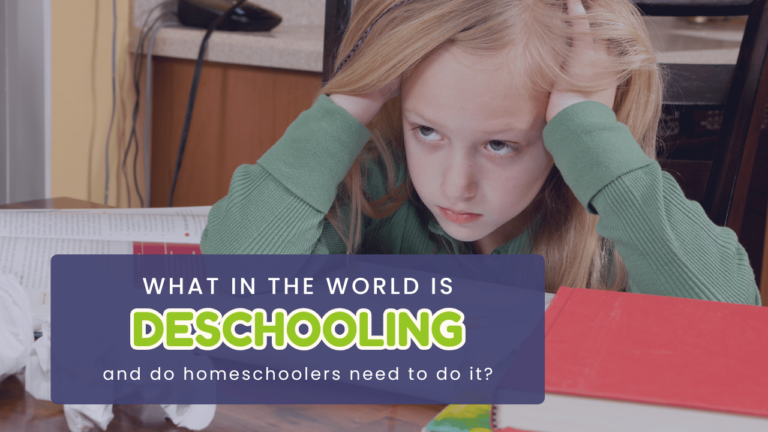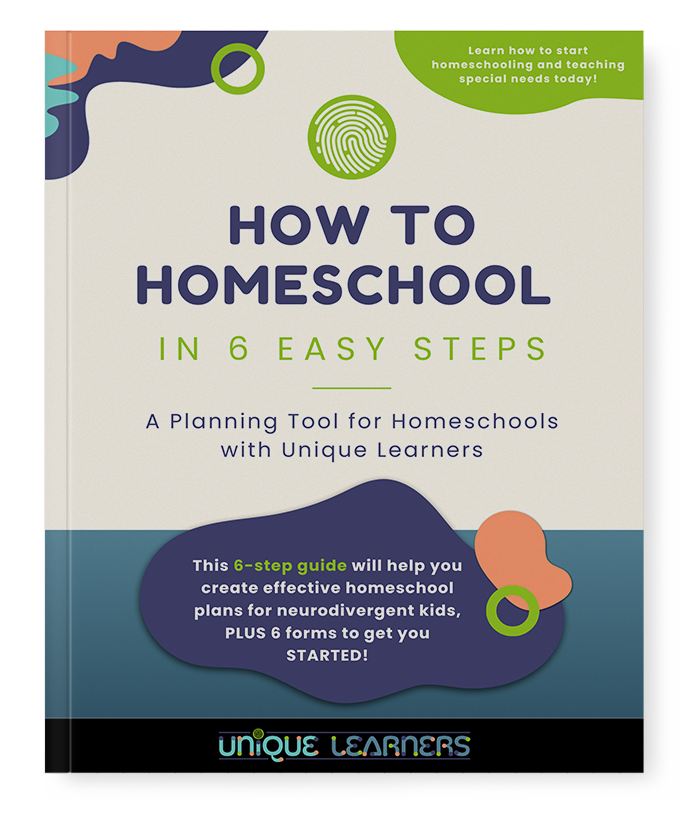Deschooling is a term that is tossed around a lot, especially when new homeschoolers pull their kids from public school and ask for assistance in how to start.
Why is deschooling necessary?
Public schools have an educational environment that is extremely focused on what grade level students are in.
Classes are run in a very time-bound schedule. Individual kids may come and go to specialist teachers throughout the day. Kids in elementary schools used to have a single classroom teacher. Today, any grade level may be set up for transitioning between two to four teachers. Of course, specialists for the entire class include physical education, music, art, foreign language, and possibly other subjects.
Grades are the reward for doing well. Grading is not a mastery-based form of evaluation. Even when kids are given multiple opportunities to improve their grade on an assignment, the grade is typically averaged to reflect the lower initial grade and the improvement. However, no one sees that improvement has been made since a single grade is recorded.
Kids know which kids are high performers and which kids are struggling. Some teachers have behavior charts posted in the classroom. Unfortunately, kids with special needs who need more frequent rewards and encouragement tend to be left out of receiving incentives. I hear stories of kids who moved from green to yellow to red regularly. The opportunities for teasing or bullying are readily available. I have even had students whose teachers have publicly humiliated them in front of an entire class.
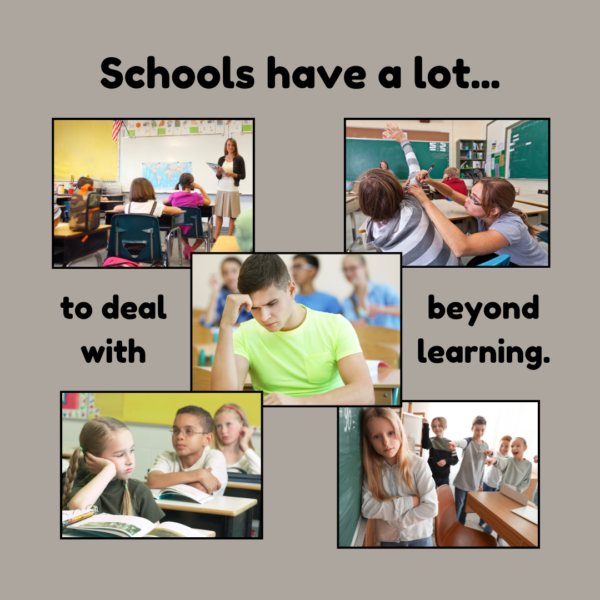
The competitive environment is intense. Then add to that standardized tests that are administered once or multiple times each year. In our state, third grade tests are such high stakes for retention that teachers tell kids they need to do well or will be held back. The pressure is way beyond what many kids can handle. Then parents are stressed and panicked wondering if their struggling reader will pass, even with an identified learning disability that is not developmentally based.
Then throw in bullying, political agendas, shooting and bomb threats, lock-downs, over-emphasis on standards, the institutional approach to learning, over-crowded class sizes, as well as burned-out and underpaid teachers with either over-controlling or elusive administrators.
OK. I’m just describing my disappointment about the way public school works in today’s world. I think it is important to describe the essential features of an institutional school so that new homeschool parents can see the reasons why deschooling is a process that can help you prepare your homeschool with a positive mindset that lets go of the competitive idea of grade levels, testing, and grades.
So what is deschooling?
Deschooling is a SHORT period of time spent transitioning from the mindset of an institutional school environment to a home-based learning place and a different educational philosophy. Deschooling can last from a week to a month.
For the parents, deschooling is a chance to get set up and explore the homeschool approach that fits the family best. This transition period allows time to research curriculum options, order, and get the home set up to encourage learning. That doesn’t necessarily mean setting up a classroom. In fact, our best homeschool times were spent at the kitchen table and on the family room couch and floor. Decide where you plan to do certain types of learning activities.
For kids, deschooling is a chance to reorient a child’s perception of what school and learning entails. Deschooling can be similar to a summer vacation, but with a focus on reading and cooperation and freedom to learn.
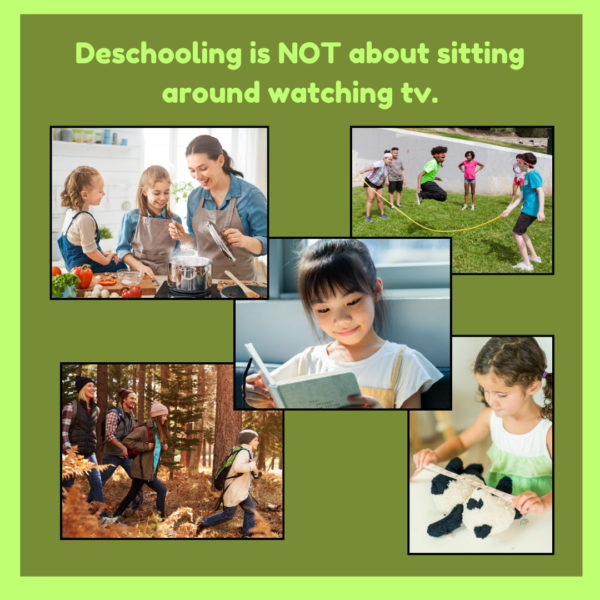
You may even want to go on a family vacation. Perhaps start by going to a national park and working through a Junior Ranger packet together as a family so that your kids get their badges.
Deschooling is a time to de-stress. Let your stressed kiddo sleep in each morning. Remove stress of the hectic pace of trying to keep up on completing school work left over from the day, getting in a certain number of minutes of reading, stressing over what to wear, and more. Take deep breaths together. Laugh about jokes or make up silly songs together.
Deschooling is a time to reorient the entire family. You can set a routine that works for your kids. Post the routine and talk about it before you begin your actual homeschool year. You may want to create small posters of learning affirmations and have your children color or decorate them. Post them around the house. Avoid the word school. Instead focus on learning. Some thoughts may be:
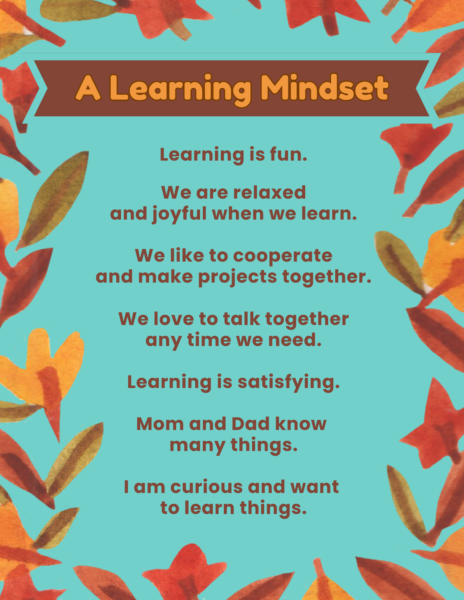
- Learning is fun.
- We are relaxed and joyful when we learn.
- We like to cooperate and make projects together.
- We love to talk together any time we need.
- Learning is satisfying.
- Mom and Dad know many things.
- I am curious and want to learn things.
Deschooling relaxes learners and eliminates expectations of pacing to standards or peers and constant assessment. One of the outcomes of deschooling is not worrying about whether your child is behind. Our brains do not work well under a hectic pace and lots of stress. Our brains work better when it has time to reflect and process incoming information without being bombarded with too much at one time. For example, schools may give 25 spelling words a week for a Friday test. Instead, a homeschool may work on 5 words each day with a visual prompt and shaving cream or sidewalk chalk. If needed, roll over one or two words to the next day based on what you or your child wants to practice more. The process is more fun, hands-on, and relaxed. The quantity is less. The child has input in what is mastered and what needs more practice without judgment or shame.
I like to say that “there is no behind in homeschooling.” Homeschooling kids with special needs typically takes the pace of the child’s learning needs, rather than a curriculum pace or a focus on standards. Because of that, a learning mastery criteria can help. I typically set 90% for my kids. Depending on the subject, 80% is appropriate. By teaching to mastery, gaps in learning are eliminated and bridged.
Deschooling also allows the family to feel freedom to do lessons anywhere or participate in groups without being tied to an arbitrary school day. Some families may do well having lessons in the early hours of the morning. Other families may prefer to do lessons in the evening. Most families stick with homeschooling somewhere within the same hours as a public school. They are often surprised that a homeschool day typically takes less time than a full school day for multiple reasons.
Is Deschooling the same thing as Unschooling?
No, deschooling and unschooling are not the same at all!
Deschooling is a transition process to transition everyone’s mindset from one educational system to another.
Unschooling is a child-led homeschool approach that is organized almost exclusively around what kids want to learn.
Unschooling requires a high level of communication and facilitation for the parent to research and gather materials that will allow and motivate the child to explore, study, and engage in life skills and academics so that their natural curiosity is stimulated and satisfied. Unschooling MAY be a good choice for a child who is naturally curious and very motivated to communicate and work hard. Unfortunately, many children do not have a personality or natural inclination to make unschooling work, and many moms don’t have the time to do the preparations, so unschooling often takes the form of not doing “school.” I’ve also seen unschooling families over the last 25 years end up sending their kids back to public schools because their kids end up not making any progress and the parents were completely frustrated with their kids’ behaviors and lack of cooperation.
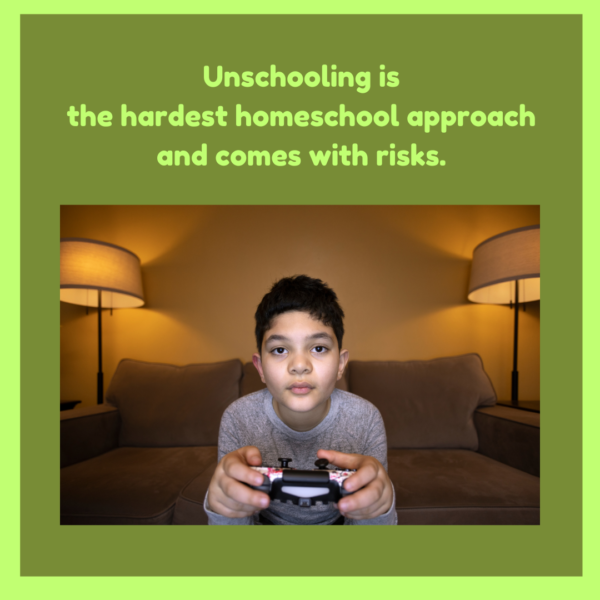
One risk of unschooling is to overemphasize household chores and minimize academics of reading, writing, math, and study skills. I think of it like this: kids don’t know what they don’t know. Part of our job as a homeschool mom is to inspire our children with new topics to explore or skills to practice. I’ve seen kids go from having no interests to being excited about ancient Rome, how castles were built, or testing things around the house for acids and bases. Again, child-led learning can get stale because kids don’t know what kids don’t know.
Another risk is to overemphasize technology without personal interaction and teaching when needed. In this situation, kids tend to withdraw into watching and playing video games, lose motivation in online school options, and end up communicating with various behaviors that are unexpected.
I seldom recommend unschooling to parents of kids with special needs. In over 30 years of teaching, I have seen that many kids with dyslexia, ADHD, autism, and other learning disabilities require very specific, explicit instruction. Unschooling tends to have routines that are so loose, kids will avoid the areas of most difficulty, which tends to be phonics/spelling, handwriting, reading, writing, math, and study skills. Most special needs homeschools end up being eclectic, molding to the child’s needs, yet not bending to the child’s direction or whims.
Do all homeschools need to deschool?
NO!
If you are homeschooling from the beginning, you can organize your homeschool around your educational philosophy from the get-go. How will you inspire a learning mindset? How will you encourage your child’s natural curiosity? How will you be sure your child is learning?
If you are pulling your child from a preschool setting, young children are very flexible and easily catch your values. The older your child, the more you may need to explicitly explain why you want to do homeschool differently than what they have been used to. However, preschoolers learn best through play, so if you provide educational toys and activities with a joyful attitude, they will likely follow your lead and not need the deschooling process.
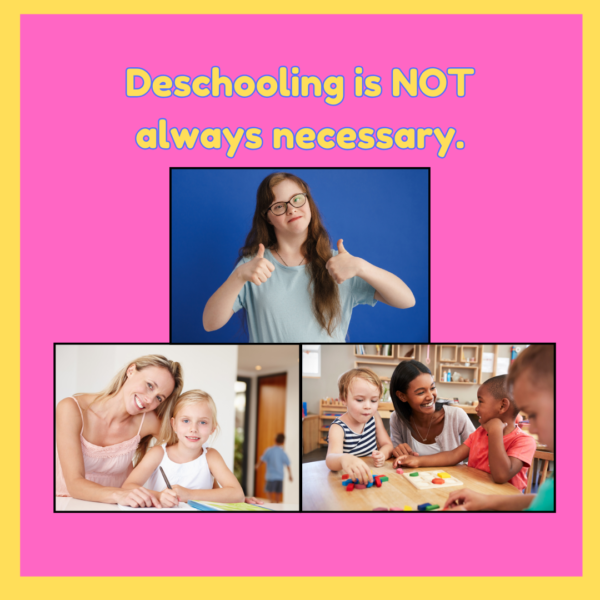
If you have a child with significant learning needs, deschooling may be more confusing and result in doing two transitions. Often kids with more severe learning needs are actually relieved to start doing school the way they actually learn. Changing the mindset happens because they are more relaxed and given materials that are developmentally appropriate. The pace is frequently slowed down to what the child can handle, so redirecting from a time-bound schedule is not necessary.
The situations when you may need to deschool are:
- When your child is insistent and conscientious about grade level.
- When your child has been stressed or anxious about school.
- When your child has had negative behavior management in a school setting.
- When your child is highly competitive about academics or lacks confidence or motivation in doing school.
- When you need to pull your child immediately from a school, and you need time to regroup for the benefit of the family.
Only you will know if your family needs a transition time to deschool. If needed, go for it! That doesn’t mean doing nothing during that time. Encourage your kids to read. Go on a couple of field trips. Set up a routine of exercise and outdoor play. Begin a read-aloud time in the morning and/or evening. Review the math that has already been mastered for maintenance. Do fun cooperative games together. Organize your materials and school supplies.
Then set a date when you will “officially” start. You may actually find you glided into the new routine you wanted!
Grab your FREE e-book guide to revamp your homeschool for success!
Are you new to homeschooling, or just wanting a fresh start? Download our FREE “How to Homeschool in 6 Easy Steps” guide and get valuable insights from Sue’s 30+ years of experience as a special educator and homeschool mom of 4!
Want to know about new products and blogs?
Join our email newsletter to be the first to know about a new homeschool and special needs blog, and new products from our shop! Sign up for only the newsletter, or grab your FREE “How to Homeschool in 6 Easy Steps” guide and you will also be added to the newsletter!
Also, join our Facebook group!
Join our new “Homeschool Help for Special Needs” Facebook group! It is a place for homeschool moms to ask questions about homeschooling a child with special learning needs, share teaching and curriculum ideas that have worked (and those that bombed), and be real about the unique challenges of homeschooling with special needs. If you want to join us, be sure to answer the member questions to help us keep this private group secure. Join us now!
